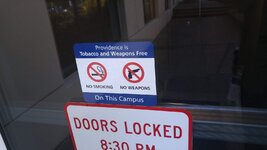- Messages
- 472
- Reactions
- 502
I noticed this new sticker a couple weeks ago at my work (as you can see, the sticker still has bubbles in it) and am a bit troubled at my place of work becoming an explicit soft target. I work in the most secure part of this hospital, so I'm less concerned for my own safety than the safety of others who work in the more vulnerable areas, such as the ER.
Of course, this sign has no real legal significance in Oregon, but I'd like to know if anyone has any ideas of how to "educate" the Providence overlords as to the danger of putting such signs up around the hospital.
Thanks!
***If this question is better suited for another forum, please move it***

Of course, this sign has no real legal significance in Oregon, but I'd like to know if anyone has any ideas of how to "educate" the Providence overlords as to the danger of putting such signs up around the hospital.
Thanks!
***If this question is better suited for another forum, please move it***














